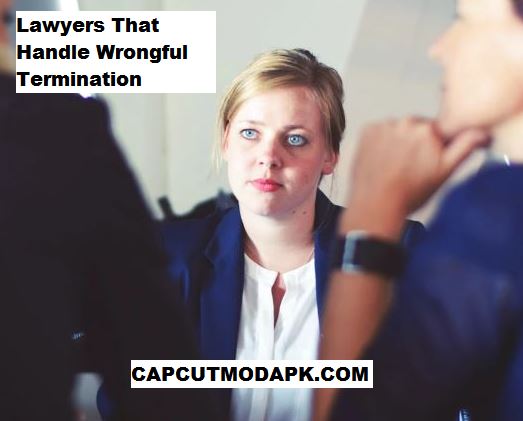Getting fired from a job hits hard. It messes with your income, peace of mind, and future plans. But getting fired for the wrong reason is worse. If it was illegal, unfair, or done to punish you for doing the right thing, that’s not just unfair. It’s wrongful termination. And you don’t have to accept it. Lawyers that handle wrongful termination can help you fight back and take legal action.
Most people don’t even realize they have rights when they’re fired. They may feel stuck, angry, or confused. That’s where a good lawyer comes in. They know what counts as wrongful, what proof matters, and how to push back against shady employers. Whether it’s discrimination, retaliation, or a violation of your contract, they can break down your case and help you get what you deserve.
In this post, you’ll learn what wrongful termination looks like, what your chances are, and how much these cases can be worth. You’ll also get real examples of people who won their cases and walked away with life-changing results. If you’re wondering whether it’s worth it to fight, the answer is yes and here’s why.
Also, READ
Best Wrongful Termination Lawyer
What Are The Odds Of Winning A Wrongful Termination Lawsuit?
Let’s get real. Not every case is a slam dunk. But that doesn’t mean it’s hopeless. If you’ve been fired for a reason that breaks the law, you’ve got a real shot. The odds depend on one thing: evidence. Can you prove your boss fired you for the wrong reason?
Here’s what helps your odds:
- Witnesses who saw or heard key events
- Emails or messages that show intent
- A clear timeline between your protected action and your firing
- Records showing other people were treated differently
Cases with clear proof tend to settle before trial. Employers don’t want a public fight they know they’ll lose. Many workers never even have to step in court. About half of all wrongful termination cases end in a settlement. Some settle for small amounts. Others hit six or even seven figures.
Winning at trial is harder but not rare. With a strong lawyer and good facts, you can win in court. The odds rise if your story is clear and backed by solid proof. If your boss broke the law and you can show it, the legal system is on your side.
What Qualifies For Wrongful Termination In Virginia?
Virginia is an “at-will” state. That means your boss can fire you for almost any reason or for no reason at all. But “almost” is the key word here. Some reasons are off-limits. If you got fired for one of them, it may be wrongful termination.
Here’s what qualifies:
- You were fired because of your race, gender, religion, or disability
- You got let go for reporting harassment, fraud, or illegal activity
- You filed for workers’ compensation and then lost your job
- You took time off for jury duty, military leave, or to vote
- You refused to do something illegal at work
Virginia also protects against firing if it goes against strong public policy. That means you can’t be punished for doing the right thing in certain situations. Courts take these cases seriously. If you were fired for standing up or speaking out, you might have a case.
Another thing to know: if you had a contract that promised job security or said you could only be fired for cause, that changes everything. A firing that breaks a contract can also be wrongful. A lawyer can look at your work situation and let you know if the firing crossed the line.
Has Anyone Ever Won A Wrongful Termination Lawsuit?
Yes, and not just once. Plenty of people have taken on their bosses and won. Some won in court. Many more got a solid payout through settlement. The wins are real, and they show what’s possible when the truth comes out.
One woman in Virginia was fired after complaining about racial slurs in the workplace. She filed a lawsuit, and after two years, she walked away with a large settlement. Her case didn’t even go to trial. The company didn’t want the bad press or the risk of losing in court.
Another worker in Richmond was let go after refusing to fake safety records at a plant. He sued for wrongful termination, and the jury awarded him over $500,000. They believed his story and wanted to send a message to the employer.
Wins come in all sizes. Some people get back pay and job offers. Others get payouts that help them move on and rebuild. The key is having a solid case, strong proof, and a lawyer who knows what they’re doing. With the right help, your case can be one of those wins too.
What Is The Most You Can Get For Wrongful Termination?

Wrongful termination payouts can range from a few thousand dollars to tens of millions. The most anyone can get depends on how much harm was done. Some cases involve serious damage to a person’s career, health, or future income. That’s when the numbers go way up.
The biggest awards often come from trial verdicts. For example, one case in California saw a worker win over $168 million. That included money for lost wages, emotional distress, and extra punishment for the employer. These massive awards are rare, but they show the law takes these issues seriously.
In most cases, payouts cover:
- Lost wages and benefits (back pay)
- Future wages (front pay)
- Pain, stress, and emotional harm
- Legal fees
- Punitive damages in extreme cases
Most people don’t get millions. But many get between $20,000 and $150,000, depending on what happened. If the firing cost you a promotion or ruined your reputation, that can boost the payout. A good lawyer will know how to tell your story and show the full damage.
Don’t assume your case is small. Talk to a lawyer and get a real answer. You might be surprised at how much your case is worth.
How Much Can I Sue My Employer For Emotional Distress?
Emotional distress matters in wrongful termination. Getting fired in a cruel or unfair way can mess with your mental health. Anxiety, panic attacks, depression, these are real effects. If your employer’s actions caused them, you can sue for emotional harm.
In Virginia, emotional distress damages are allowed in certain wrongful termination cases. But you have to prove the harm. That means showing how your firing affected your life. This might include:
- Doctor or therapist notes
- Medications you now take
- Witnesses who saw changes in you
- Your own written records or journal entries
The amount you can sue for depends on how bad the harm was. Some people get $10,000. Others get over $100,000 just for emotional pain. The more proof you have, the stronger your case.
Judges and juries want to know you didn’t just have a bad day, you suffered real harm. A skilled lawyer will help you build this part of your case. If you’ve had panic attacks, trouble sleeping, or can’t enjoy life like before, that matters. You deserve to be made whole. The law agrees.
Is Wrongful Termination Hard To Prove?
It can be. But it depends on what you have. Employers usually won’t say, “I’m firing you because of your race” or “you’re a whistleblower, and we hate that.” They try to hide behind other reasons. That’s what makes it tricky. But tricky doesn’t mean impossible.
Proof is everything. If you have emails, text messages, or notes from meetings, that’s gold. If other workers were treated differently than you, that helps too. Even timing can tell a story. If you filed a report on Tuesday and got fired on Friday, that says a lot.
Here are signs your case may be strong:
- You had good reviews, then got fired after reporting something
- You were replaced by someone younger, cheaper, or outside your race
- You were denied HR help or punished for speaking up
- You have a contract or policy that was broken
A wrongful termination lawyer knows what to look for. They’ll go through your case and find the pressure points. What’s hard for one person is clear as day for an expert. So don’t assume it’s too hard to prove. Let someone who knows the law take a look.
Conclusion
Getting fired is bad. But getting fired for the wrong reason? That’s a legal problem. If it happened to you, don’t just let it go. Talk to lawyers that handle wrongful termination. They know how to spot illegal firings, find the proof, and build a case that gets results.
Whether your case is about discrimination, retaliation, or emotional harm, the law may be on your side. You might be owed back pay, emotional damages, or even your job back. The key is acting fast. The sooner you get legal advice, the stronger your case can be.
Don’t let fear or doubt stop you. Many people have stood up and won. Some got money. Others got justice. You can too. Find the right lawyer and take that first step. You don’t have to fight this alone.


